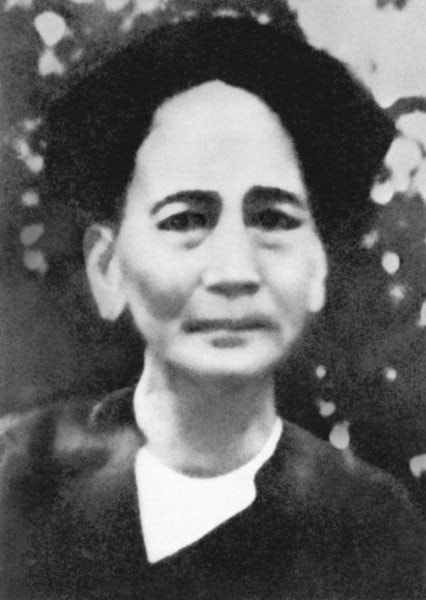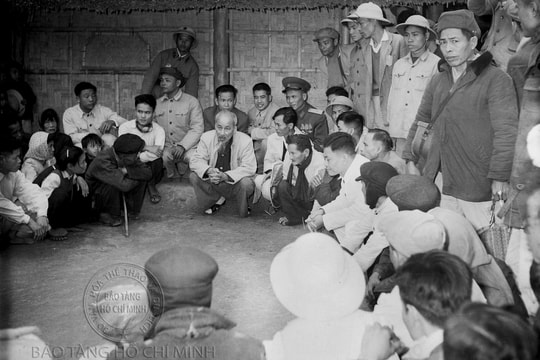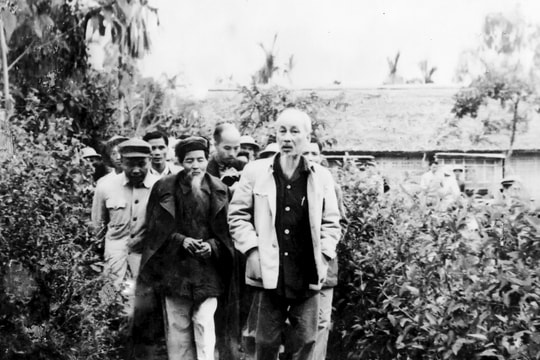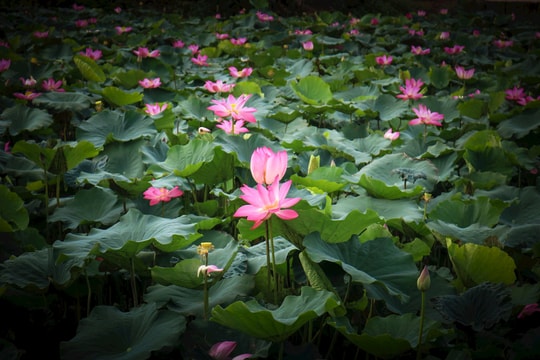Remembering the life of Ms. Thanh - poetess Bach Lien
Besides his biological father and mother, Mr. Nguyen Sinh Sac and Mrs. Hoang Thi Loan, the person who had the most influence on President Ho Chi Minh was his older sister, Ms. Nguyen Thi Thanh.
Family is the first cradle of each person to form good feelings, childhood personality contributes to nurturing personality. For President Ho Chi Minh, in addition to the good traditions of his homeland and family, the example of his relatives had a strong and profound influence on the formation of his noble personality.
Besides his biological father and mother, Mr. Nguyen Sinh Sac and Mrs. Hoang Thi Loan, the person who had the most influence on him was his older sister, Ms. Nguyen Thi Thanh.
Like her two younger brothers, Thanh was born on the land of Hoang Tru, her mother's homeland (1884), living in the love and teachings of her parents, grandparents and aunt An (Mrs. Hoang Thi An, younger sister of Mrs. Hoang Thi Loan). Since childhood, Thanh was taught good and right things, to love work and to live with love. As the first daughter, she soon revealed the good and filial qualities of a child, grandchild and eldest sister in the family.

In 1895, when her parents and two younger siblings went to Hue, Thanh had to stay with her grandmother so that they could be together day and night, helping with housework and taking care of her when she was sick. Just 11 years old, she had to leave her parents' arms, away from the laughter of her younger siblings. At that age, it was impossible to avoid sadness and crying nights because of missing her mother. And then, being away from her mother that year until the day her mother passed away forever in the capital, she did not get to see her mother again. Perhaps that was the pain and the great loss that later, during her house arrest in Hue, during a trip to visit her hometown in 1922, she secretly brought her mother's remains, climbing mountains and wading through streams hundreds of kilometers back to her hometown for burial. That was the extraordinary willpower of a filial daughter. Later, her younger brother, Nguyen Sinh Khiem, found a beautiful location on Dong Tranh mountain, Nam Giang commune, as the eternal resting place for his beloved mother.
When Mr. Nguyen Sinh Sac passed the Pho Bang exam, his family returned to Lang Sen to "return home to honor their ancestors". At this time, Ms. Thanh was a 17-year-old girl, fluent in Chinese characters, and especially had a good understanding of traditional medicine. Young men in the village and outside the commune wanted to ask her to marry them. Normally, a girl at that most beautiful age would have a dream of a happy family of her own. However, with her filial piety towards her father and love for her younger siblings, she refused them all, temporarily putting aside her own happiness. She was responsible for taking care of the family, supporting her father and taking care of her younger siblings when her mother was no longer around; taking on the responsibility of an older sister and fulfilling the role of a mother in the family. Therefore, during the years in her hometown, although her mother was no longer around, Uncle Ho's brothers were still cared for and loved with all their heart. Thanh's sacrifice and filial piety were perhaps influenced by the noble life of her mother, Hoang Thi Loan.
.jpg)
In 1906, Mr. Nguyen Sinh Sac went to Hue to become an official, bringing his two sons with him, while Ms. Thanh stayed behind to look after the house and fields. What she could not have imagined was that the second time she saw her father and two younger siblings off to Hue would also be the last time she would see her beloved father. In 1929, Mr. Nguyen Sinh Sac passed away in Cao Lanh (Dong Thap), Ms. Thanh was also the only child in the family who was allowed to burn incense to say goodbye to her father.
Ms. Thanh's life not only shone with sacrifice and filial piety, but she was also a shining example of patriotism, bravery and loyalty. Being born and raised in a land rich in tradition, she nurtured in herself a sense of patriotism and national pride. Growing up, witnessing the misery and slavery of the people who lost their country, soon kindled in her a hatred and a will to fight off the invaders. Therefore, during her youth in Lang Sen, she actively participated in patriotic activities in the movements of Doi Quyen and Doi Phan, working as a liaison to raise money for the insurgents and the Dong Du movement. In 1910, while she was on liaison duty, she was captured by the enemy. Although the enemy brutally beat and tortured her in many ways, she still did not reveal a word. Because they could not find concrete evidence, they had to release her.
.jpg)
In response to Thanh's patriotic activities, the Central Region Apostolic Delegation created a file with the code A11667 to monitor her. But she was not afraid. Immediately after being released from prison, she opened a restaurant in Vinh as a secret communication location and took weapons from the soldiers in the green uniform to supply the insurgents. On February 5, 1918, she participated in stealing guns from the warehouse of the Military Prison. Unfortunately, the incident was exposed, she was arrested and sentenced to 9 years of hard labor and exile from her homeland. On December 2, 1918, Thanh was sent to Quang Ngai prison. During those years, with her kind heart and knowledge of traditional medicine, she helped treat and save people. That is why she was loved and respected everywhere.
After years of exile and house arrest, on September 18, 1940, Nguyen Thi Thanh was released and returned to her homeland.
In 1946, when she heard that her younger brother was President Ho Chi Minh, she was extremely happy. Thanh went to Hanoi to visit her brother. The emotional meeting between the older sister and her younger brother after decades of separation, there were so many stories to tell, stories about the village, relatives, family. However, it was still the heart of an understanding and sympathetic older sister. Knowing the responsibility of the leader in the midst of the country's affairs, in the short moments of meeting and saying goodbye to her younger brother, Thanh returned to her hometown. In her old age, she lived a simple, exemplary life with the village, relatives in Sen Village.
.jpg)
On April 25, 1954 (March 23, Giap Ngo year), she breathed her last, at the age of 70, in the grief and respect of her relatives and the people of Kim Lien commune.
The life of Ms. Nguyen Thi Thanh is a shining example of Vietnamese women, noble qualities, an example of deep patriotism. It is from the example, the life of her sister and relatives that had a profound influence on the formation of good feelings, noble personality of President Ho Chi Minh.



.jpeg)

